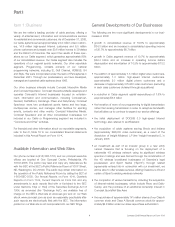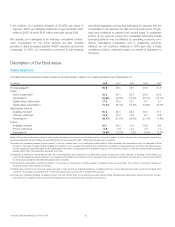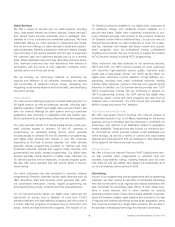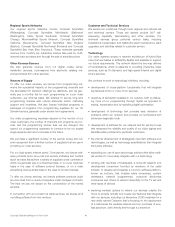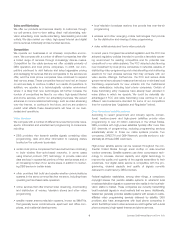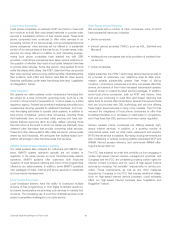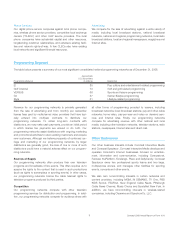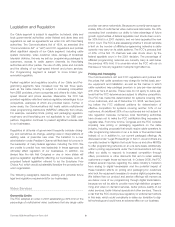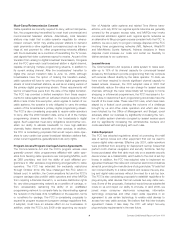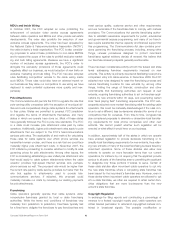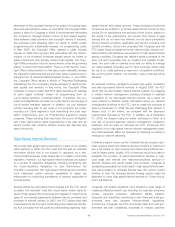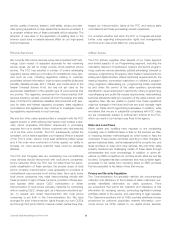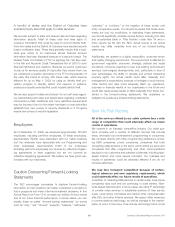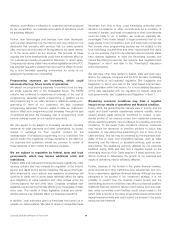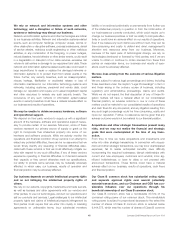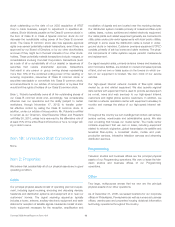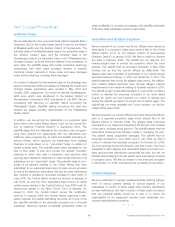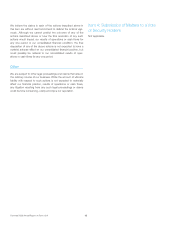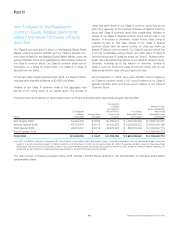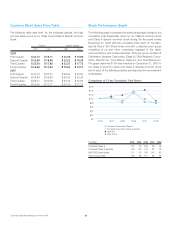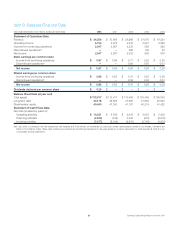Comcast 2008 Annual Report Download - page 13
Download and view the complete annual report
Please find page 13 of the 2008 Comcast annual report below. You can navigate through the pages in the report by either clicking on the pages listed below, or by using the keyword search tool below to find specific information within the annual report.
elimination of this copyright license is the subject of ongoing legis-
lative and administrative review. In June 2008, the Copyright Office
issued a report to Congress in which it recommended eliminating
the compulsory copyright license in favor of free market negotia-
tions between cable operators and copyright owners. If adopted,
this proposal could adversely affect our ability to obtain certain
programming and substantially increase our programming costs.
In May 2008, the Copyright Office rejected a cable industry
request to clarify that copyright fees associated with the retrans-
mission of out-of-market broadcast signals should be limited to
system customers who actually receive those signals. The Copy-
right Office concluded it did not have authority under the governing
statute to adopt that interpretation. There is a risk that the Copy-
right Office’s determination on this issue could materially increase
the copyright royalty fees that we and other cable operators pay to
retransmit out-of-market broadcast signals. Further, in June 2008,
the Copyright Office issued a Notice of Proposed Rulemaking
addressing how the compulsory license will apply to digital broad-
cast signals and services. In this notice, the Copyright Office
proposed to require royalty fees from cable operators for carriage
of each digital multicast stream of programming from an
out-of-market television broadcast station. If adopted, this pro-
posal could significantly increase our royalty fees for the carriage of
out-of-market television stations. In addition, we pay standard
industry licensing fees to use music in the programs we create,
including our Cable segment’s local advertising and local origi-
nation programming, and our Programming segment’s original
programs. These licensing fees have been the source of litigation
with music performance rights organizations in the past and we
cannot predict with certainty whether license fee disputes may
arise in the future.
High-Speed Internet Services
We provide high-speed Internet services by means of our existing
cable systems. In 2002, the FCC ruled that this was an interstate
information service that is not subject to regulation as a tele-
communications service under federal law or to state or local utility
regulation. However, our high-speed Internet services are subject
to a number of regulatory obligations, including compliance with
the Communications Assistance for Law Enforcement Act
(“CALEA”) requirement that high-speed Internet service providers
must implement certain network capabilities to assist law
enforcement in conducting surveillance of persons suspected of
criminal activity.
Several parties are advocating that Congress and the FCC adopt
so-called “net neutrality” rules that would define certain rights for
users of high-speed Internet services and regulate or restrict some
types of commercial agreements between service providers and
providers of Internet content. In 2005, the FCC issued what was
characterized at the time as a nonbinding policy statement identify-
ing four principles that will guide its policymaking regarding high-
speed Internet and related services. These principles provide that
consumers are entitled to: (i) access lawful Internet content of their
choice; (ii) run applications and services of their choice, subject to
the needs of law enforcement; (iii) connect their choice of legal
devices that do not harm the network; and (iv) enjoy competition
among network providers, application and service providers, and
content providers. Some have proposed that Congress and the
FCC adopt these principles as formal rules and also impose non-
discrimination and disclosure requirements on high-speed Internet
service providers. Congress has rejected similar proposals in the
past, but such proposals may be revisited and possibly broad-
ened. Any such rules or statutes could limit our ability to manage
our cable systems (including use for other services), obtain value
for use of our cable systems or respond to competitive conditions.
We cannot predict whether “net neutrality” rules or statutes will be
adopted.
All networks must be managed to provide high-quality, consistent
and safe high-speed Internet services. In August 2008, the FCC
found that we had violated “federal Internet policies” by engaging
in certain network management practices intended to address
congestion on our high-speed Internet network. As a result, we
were ordered to disclose certain information about our network
management practices to the FCC, and to cease the practices at
issue by December 31, 2008. We are challenging that decision in
federal court. In the interim, we complied with the disclosure
requirements imposed by the FCC. In addition, as of December
31, 2008, we stopped using our earlier techniques in favor of a
new set of protocol-agnostic network management congestion
practices, and we have so informed the FCC. Continued FCC
regulation of our high-speed Internet network management practi-
ces could adversely affect our business by impairing our ability to
manage our network efficiently.
A federal program known as the Universal Service program gen-
erally requires telecommunications service providers to collect and
pay a fee based on their revenue from telecommunications serv-
ices (in recent years, roughly 10% of revenue) into a fund used to
subsidize the provision of telecommunications services in high-
cost areas and Internet and telecommunications services to
schools, libraries and certain health care providers. Congress is
considering proposals that could result in high-speed Internet serv-
ices being subject to Universal Service fees. We cannot predict
whether or how the Universal Service funding system might be
extended to cover high-speed Internet services or, if that occurs,
how it will affect us.
Congress and federal regulators have adopted a wide range of
measures affecting Internet use, including, for example, consumer
privacy, copyright protection, defamation liability, taxation,
obscenity and unsolicited commercial e-mail. State and local gov-
ernments have also adopted Internet-related regulations.
Furthermore, Congress, the FCC and certain state and local gov-
ernments are also considering proposals to impose customer
11 Comcast 2008 Annual Report on Form 10-K


